Codes of Ethics
VerifiedAdded on 2023/04/20
|6
|1857
|317
AI Summary
This article discusses the importance of codes of ethics in the nursing profession, focusing on the ANA code of provision 7. It explores how research, professional standards development, and nursing and health policy contribute to better care outcomes. The article emphasizes the need for nurses to advance the profession through research and scholarly inquiry, professional standard development, and the generation of nursing and health policy.
Contribute Materials
Your contribution can guide someone’s learning journey. Share your
documents today.
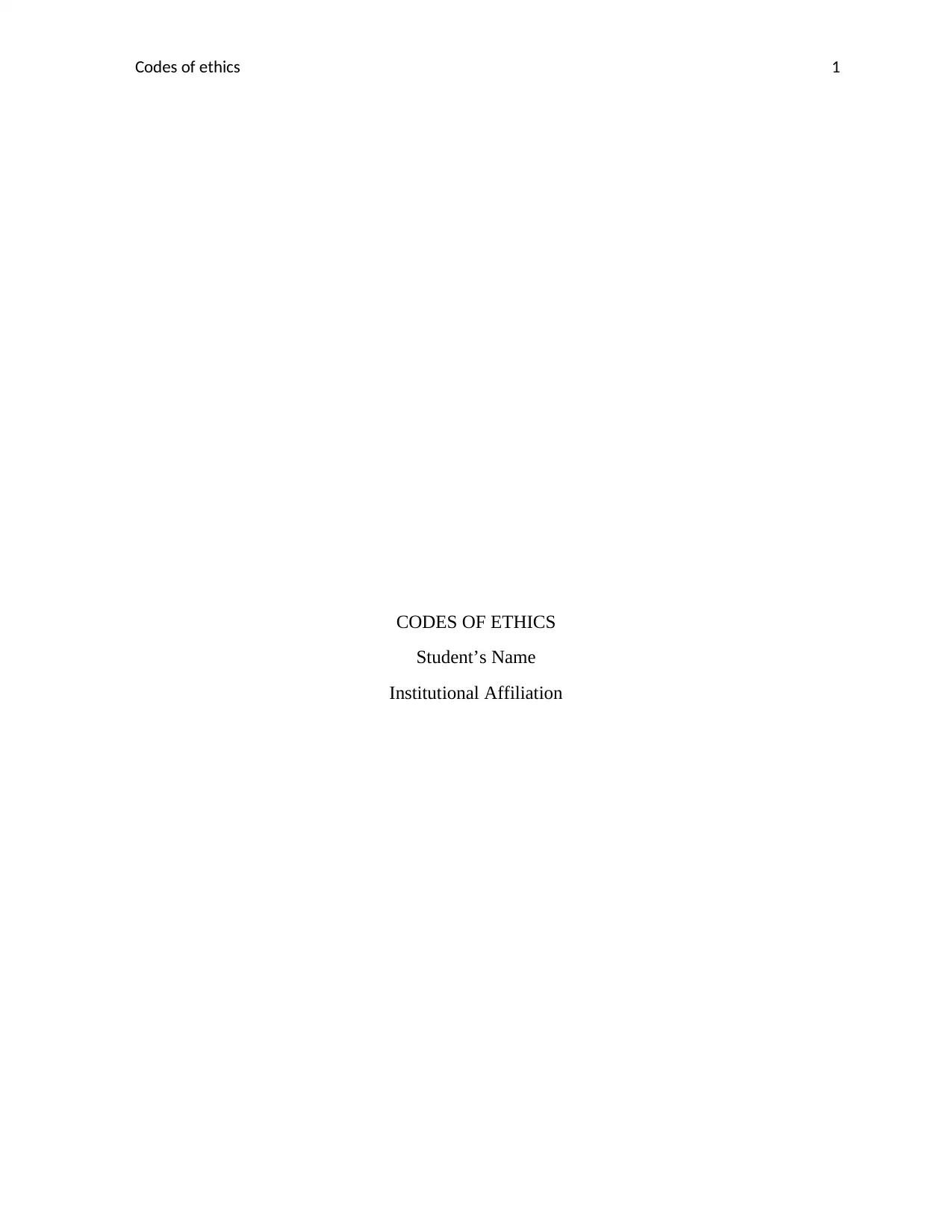
Codes of ethics 1
CODES OF ETHICS
Student’s Name
Institutional Affiliation
CODES OF ETHICS
Student’s Name
Institutional Affiliation
Secure Best Marks with AI Grader
Need help grading? Try our AI Grader for instant feedback on your assignments.
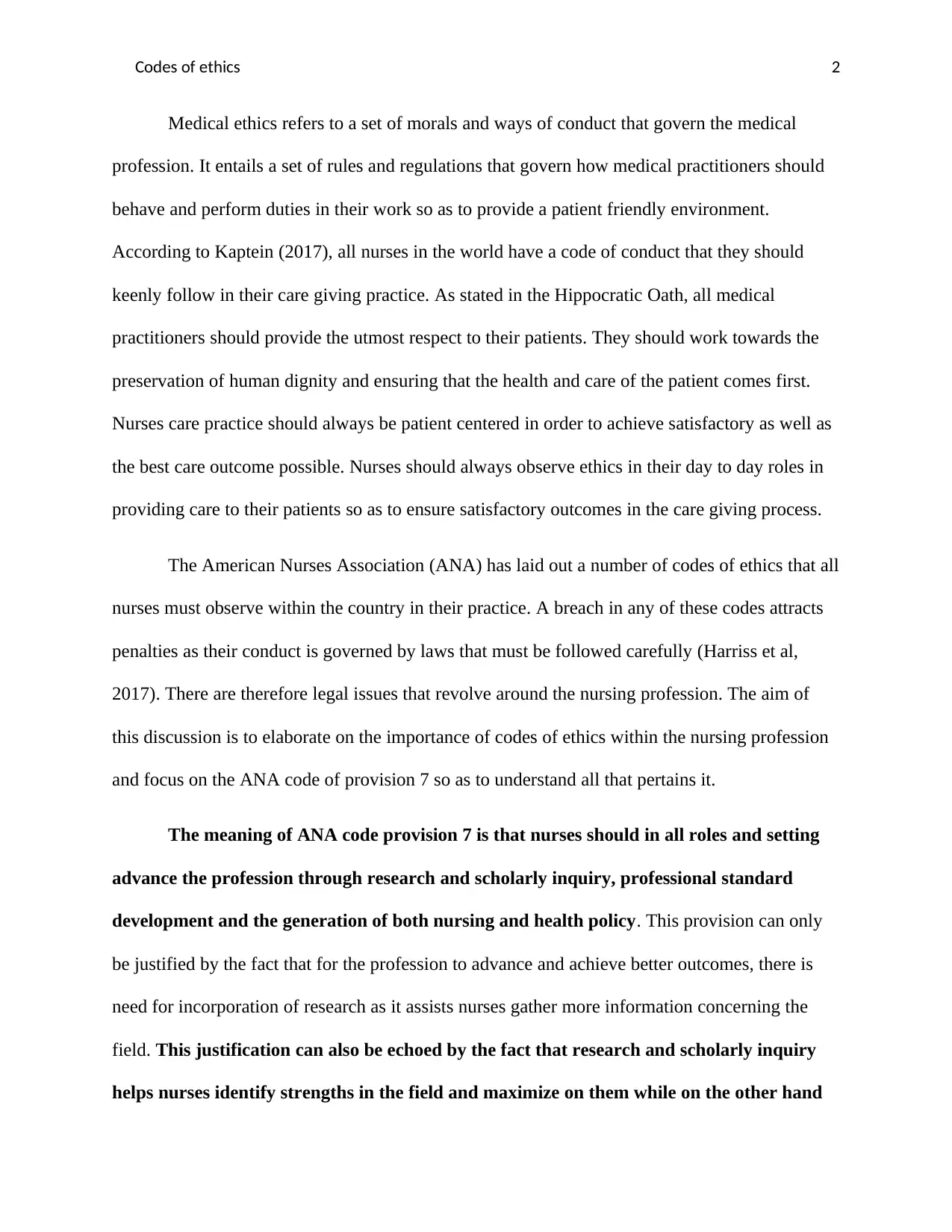
Codes of ethics 2
Medical ethics refers to a set of morals and ways of conduct that govern the medical
profession. It entails a set of rules and regulations that govern how medical practitioners should
behave and perform duties in their work so as to provide a patient friendly environment.
According to Kaptein (2017), all nurses in the world have a code of conduct that they should
keenly follow in their care giving practice. As stated in the Hippocratic Oath, all medical
practitioners should provide the utmost respect to their patients. They should work towards the
preservation of human dignity and ensuring that the health and care of the patient comes first.
Nurses care practice should always be patient centered in order to achieve satisfactory as well as
the best care outcome possible. Nurses should always observe ethics in their day to day roles in
providing care to their patients so as to ensure satisfactory outcomes in the care giving process.
The American Nurses Association (ANA) has laid out a number of codes of ethics that all
nurses must observe within the country in their practice. A breach in any of these codes attracts
penalties as their conduct is governed by laws that must be followed carefully (Harriss et al,
2017). There are therefore legal issues that revolve around the nursing profession. The aim of
this discussion is to elaborate on the importance of codes of ethics within the nursing profession
and focus on the ANA code of provision 7 so as to understand all that pertains it.
The meaning of ANA code provision 7 is that nurses should in all roles and setting
advance the profession through research and scholarly inquiry, professional standard
development and the generation of both nursing and health policy. This provision can only
be justified by the fact that for the profession to advance and achieve better outcomes, there is
need for incorporation of research as it assists nurses gather more information concerning the
field. This justification can also be echoed by the fact that research and scholarly inquiry
helps nurses identify strengths in the field and maximize on them while on the other hand
Medical ethics refers to a set of morals and ways of conduct that govern the medical
profession. It entails a set of rules and regulations that govern how medical practitioners should
behave and perform duties in their work so as to provide a patient friendly environment.
According to Kaptein (2017), all nurses in the world have a code of conduct that they should
keenly follow in their care giving practice. As stated in the Hippocratic Oath, all medical
practitioners should provide the utmost respect to their patients. They should work towards the
preservation of human dignity and ensuring that the health and care of the patient comes first.
Nurses care practice should always be patient centered in order to achieve satisfactory as well as
the best care outcome possible. Nurses should always observe ethics in their day to day roles in
providing care to their patients so as to ensure satisfactory outcomes in the care giving process.
The American Nurses Association (ANA) has laid out a number of codes of ethics that all
nurses must observe within the country in their practice. A breach in any of these codes attracts
penalties as their conduct is governed by laws that must be followed carefully (Harriss et al,
2017). There are therefore legal issues that revolve around the nursing profession. The aim of
this discussion is to elaborate on the importance of codes of ethics within the nursing profession
and focus on the ANA code of provision 7 so as to understand all that pertains it.
The meaning of ANA code provision 7 is that nurses should in all roles and setting
advance the profession through research and scholarly inquiry, professional standard
development and the generation of both nursing and health policy. This provision can only
be justified by the fact that for the profession to advance and achieve better outcomes, there is
need for incorporation of research as it assists nurses gather more information concerning the
field. This justification can also be echoed by the fact that research and scholarly inquiry
helps nurses identify strengths in the field and maximize on them while on the other hand
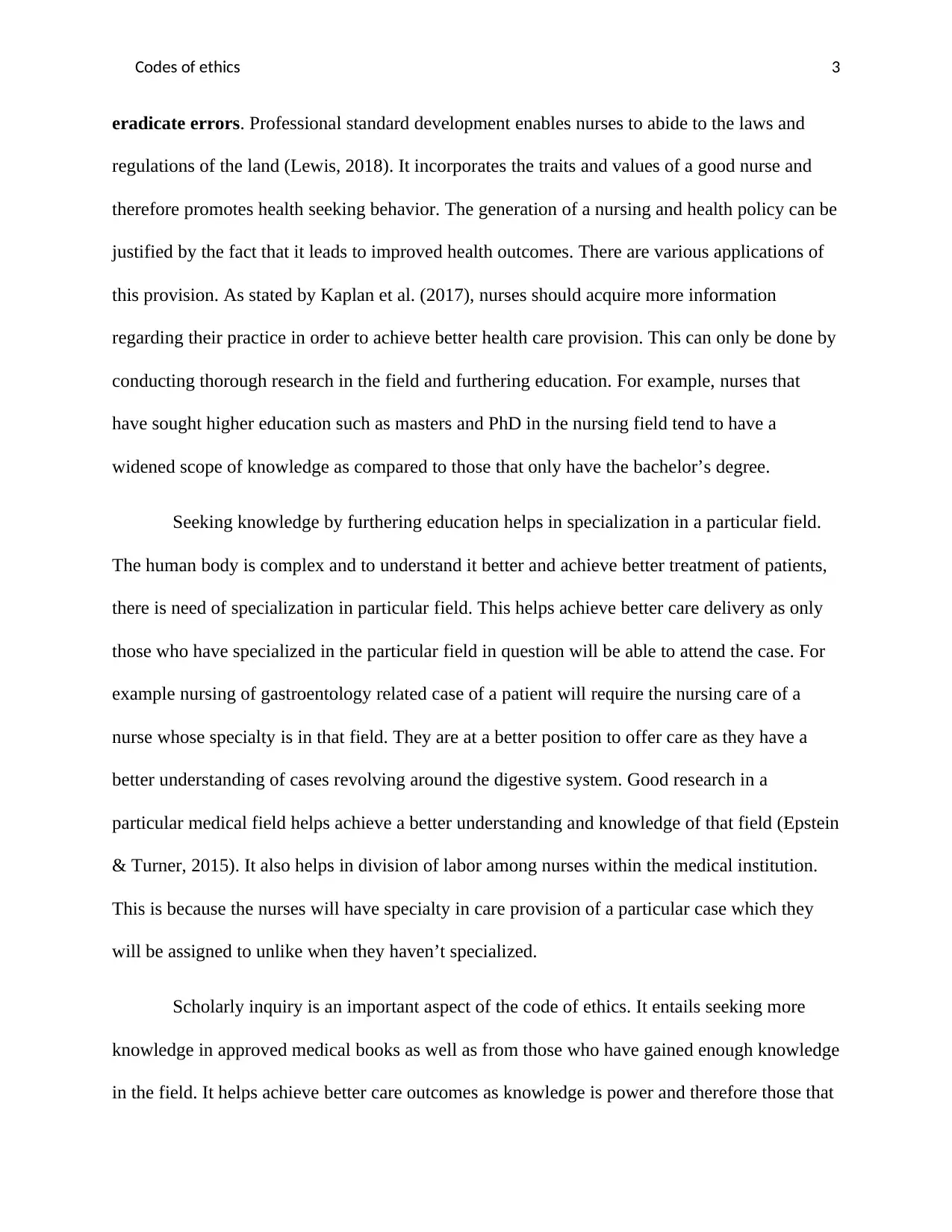
Codes of ethics 3
eradicate errors. Professional standard development enables nurses to abide to the laws and
regulations of the land (Lewis, 2018). It incorporates the traits and values of a good nurse and
therefore promotes health seeking behavior. The generation of a nursing and health policy can be
justified by the fact that it leads to improved health outcomes. There are various applications of
this provision. As stated by Kaplan et al. (2017), nurses should acquire more information
regarding their practice in order to achieve better health care provision. This can only be done by
conducting thorough research in the field and furthering education. For example, nurses that
have sought higher education such as masters and PhD in the nursing field tend to have a
widened scope of knowledge as compared to those that only have the bachelor’s degree.
Seeking knowledge by furthering education helps in specialization in a particular field.
The human body is complex and to understand it better and achieve better treatment of patients,
there is need of specialization in particular field. This helps achieve better care delivery as only
those who have specialized in the particular field in question will be able to attend the case. For
example nursing of gastroentology related case of a patient will require the nursing care of a
nurse whose specialty is in that field. They are at a better position to offer care as they have a
better understanding of cases revolving around the digestive system. Good research in a
particular medical field helps achieve a better understanding and knowledge of that field (Epstein
& Turner, 2015). It also helps in division of labor among nurses within the medical institution.
This is because the nurses will have specialty in care provision of a particular case which they
will be assigned to unlike when they haven’t specialized.
Scholarly inquiry is an important aspect of the code of ethics. It entails seeking more
knowledge in approved medical books as well as from those who have gained enough knowledge
in the field. It helps achieve better care outcomes as knowledge is power and therefore those that
eradicate errors. Professional standard development enables nurses to abide to the laws and
regulations of the land (Lewis, 2018). It incorporates the traits and values of a good nurse and
therefore promotes health seeking behavior. The generation of a nursing and health policy can be
justified by the fact that it leads to improved health outcomes. There are various applications of
this provision. As stated by Kaplan et al. (2017), nurses should acquire more information
regarding their practice in order to achieve better health care provision. This can only be done by
conducting thorough research in the field and furthering education. For example, nurses that
have sought higher education such as masters and PhD in the nursing field tend to have a
widened scope of knowledge as compared to those that only have the bachelor’s degree.
Seeking knowledge by furthering education helps in specialization in a particular field.
The human body is complex and to understand it better and achieve better treatment of patients,
there is need of specialization in particular field. This helps achieve better care delivery as only
those who have specialized in the particular field in question will be able to attend the case. For
example nursing of gastroentology related case of a patient will require the nursing care of a
nurse whose specialty is in that field. They are at a better position to offer care as they have a
better understanding of cases revolving around the digestive system. Good research in a
particular medical field helps achieve a better understanding and knowledge of that field (Epstein
& Turner, 2015). It also helps in division of labor among nurses within the medical institution.
This is because the nurses will have specialty in care provision of a particular case which they
will be assigned to unlike when they haven’t specialized.
Scholarly inquiry is an important aspect of the code of ethics. It entails seeking more
knowledge in approved medical books as well as from those who have gained enough knowledge
in the field. It helps achieve better care outcomes as knowledge is power and therefore those that
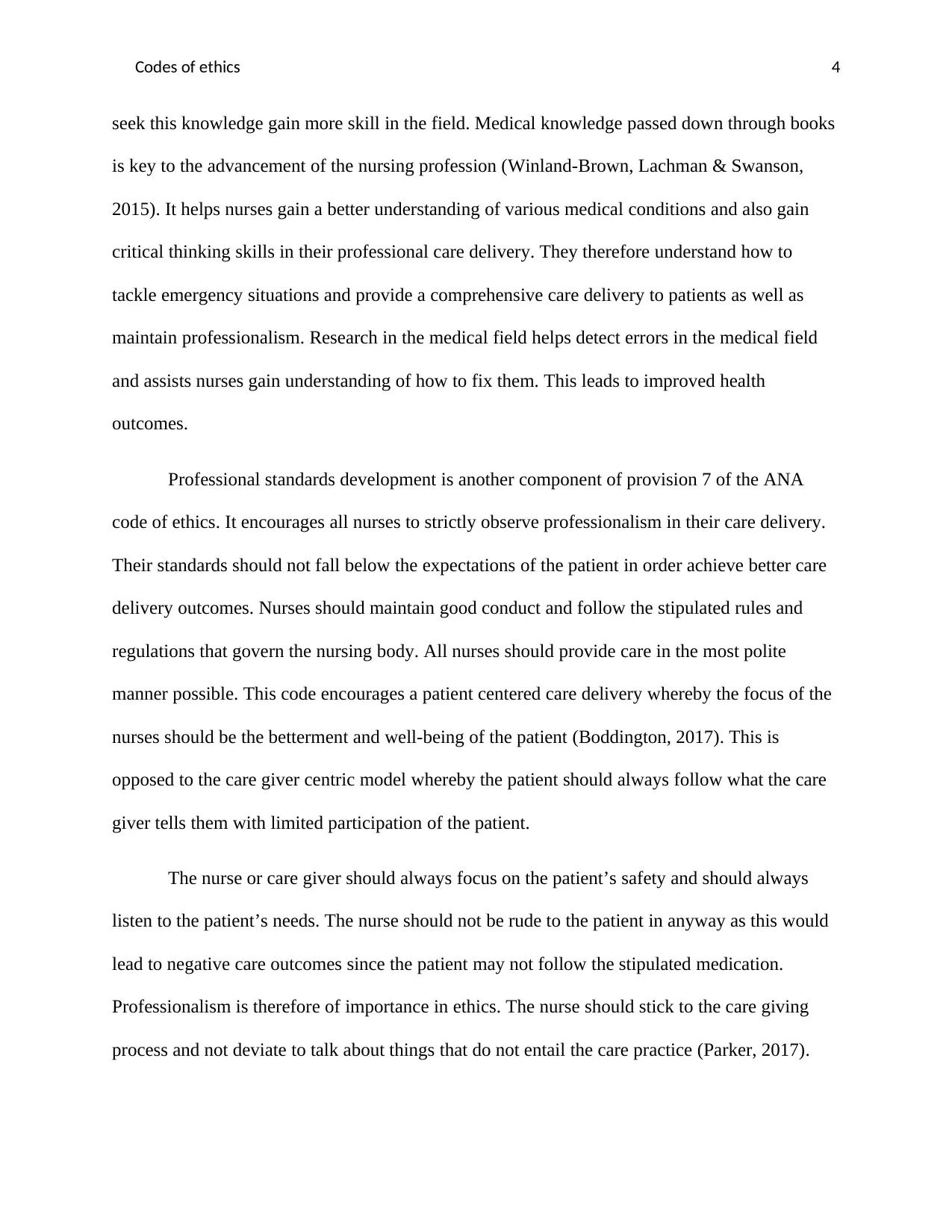
Codes of ethics 4
seek this knowledge gain more skill in the field. Medical knowledge passed down through books
is key to the advancement of the nursing profession (Winland-Brown, Lachman & Swanson,
2015). It helps nurses gain a better understanding of various medical conditions and also gain
critical thinking skills in their professional care delivery. They therefore understand how to
tackle emergency situations and provide a comprehensive care delivery to patients as well as
maintain professionalism. Research in the medical field helps detect errors in the medical field
and assists nurses gain understanding of how to fix them. This leads to improved health
outcomes.
Professional standards development is another component of provision 7 of the ANA
code of ethics. It encourages all nurses to strictly observe professionalism in their care delivery.
Their standards should not fall below the expectations of the patient in order achieve better care
delivery outcomes. Nurses should maintain good conduct and follow the stipulated rules and
regulations that govern the nursing body. All nurses should provide care in the most polite
manner possible. This code encourages a patient centered care delivery whereby the focus of the
nurses should be the betterment and well-being of the patient (Boddington, 2017). This is
opposed to the care giver centric model whereby the patient should always follow what the care
giver tells them with limited participation of the patient.
The nurse or care giver should always focus on the patient’s safety and should always
listen to the patient’s needs. The nurse should not be rude to the patient in anyway as this would
lead to negative care outcomes since the patient may not follow the stipulated medication.
Professionalism is therefore of importance in ethics. The nurse should stick to the care giving
process and not deviate to talk about things that do not entail the care practice (Parker, 2017).
seek this knowledge gain more skill in the field. Medical knowledge passed down through books
is key to the advancement of the nursing profession (Winland-Brown, Lachman & Swanson,
2015). It helps nurses gain a better understanding of various medical conditions and also gain
critical thinking skills in their professional care delivery. They therefore understand how to
tackle emergency situations and provide a comprehensive care delivery to patients as well as
maintain professionalism. Research in the medical field helps detect errors in the medical field
and assists nurses gain understanding of how to fix them. This leads to improved health
outcomes.
Professional standards development is another component of provision 7 of the ANA
code of ethics. It encourages all nurses to strictly observe professionalism in their care delivery.
Their standards should not fall below the expectations of the patient in order achieve better care
delivery outcomes. Nurses should maintain good conduct and follow the stipulated rules and
regulations that govern the nursing body. All nurses should provide care in the most polite
manner possible. This code encourages a patient centered care delivery whereby the focus of the
nurses should be the betterment and well-being of the patient (Boddington, 2017). This is
opposed to the care giver centric model whereby the patient should always follow what the care
giver tells them with limited participation of the patient.
The nurse or care giver should always focus on the patient’s safety and should always
listen to the patient’s needs. The nurse should not be rude to the patient in anyway as this would
lead to negative care outcomes since the patient may not follow the stipulated medication.
Professionalism is therefore of importance in ethics. The nurse should stick to the care giving
process and not deviate to talk about things that do not entail the care practice (Parker, 2017).
Secure Best Marks with AI Grader
Need help grading? Try our AI Grader for instant feedback on your assignments.
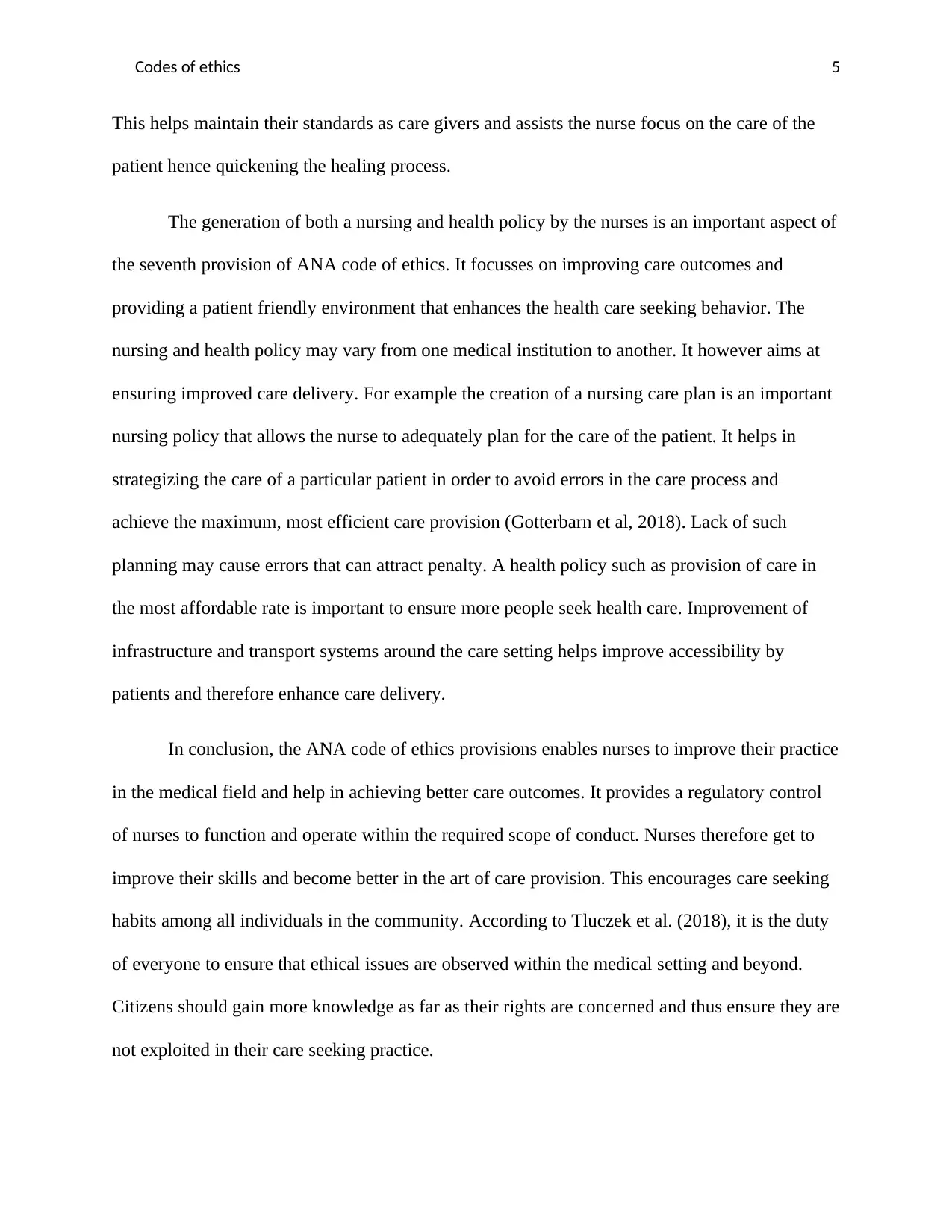
Codes of ethics 5
This helps maintain their standards as care givers and assists the nurse focus on the care of the
patient hence quickening the healing process.
The generation of both a nursing and health policy by the nurses is an important aspect of
the seventh provision of ANA code of ethics. It focusses on improving care outcomes and
providing a patient friendly environment that enhances the health care seeking behavior. The
nursing and health policy may vary from one medical institution to another. It however aims at
ensuring improved care delivery. For example the creation of a nursing care plan is an important
nursing policy that allows the nurse to adequately plan for the care of the patient. It helps in
strategizing the care of a particular patient in order to avoid errors in the care process and
achieve the maximum, most efficient care provision (Gotterbarn et al, 2018). Lack of such
planning may cause errors that can attract penalty. A health policy such as provision of care in
the most affordable rate is important to ensure more people seek health care. Improvement of
infrastructure and transport systems around the care setting helps improve accessibility by
patients and therefore enhance care delivery.
In conclusion, the ANA code of ethics provisions enables nurses to improve their practice
in the medical field and help in achieving better care outcomes. It provides a regulatory control
of nurses to function and operate within the required scope of conduct. Nurses therefore get to
improve their skills and become better in the art of care provision. This encourages care seeking
habits among all individuals in the community. According to Tluczek et al. (2018), it is the duty
of everyone to ensure that ethical issues are observed within the medical setting and beyond.
Citizens should gain more knowledge as far as their rights are concerned and thus ensure they are
not exploited in their care seeking practice.
This helps maintain their standards as care givers and assists the nurse focus on the care of the
patient hence quickening the healing process.
The generation of both a nursing and health policy by the nurses is an important aspect of
the seventh provision of ANA code of ethics. It focusses on improving care outcomes and
providing a patient friendly environment that enhances the health care seeking behavior. The
nursing and health policy may vary from one medical institution to another. It however aims at
ensuring improved care delivery. For example the creation of a nursing care plan is an important
nursing policy that allows the nurse to adequately plan for the care of the patient. It helps in
strategizing the care of a particular patient in order to avoid errors in the care process and
achieve the maximum, most efficient care provision (Gotterbarn et al, 2018). Lack of such
planning may cause errors that can attract penalty. A health policy such as provision of care in
the most affordable rate is important to ensure more people seek health care. Improvement of
infrastructure and transport systems around the care setting helps improve accessibility by
patients and therefore enhance care delivery.
In conclusion, the ANA code of ethics provisions enables nurses to improve their practice
in the medical field and help in achieving better care outcomes. It provides a regulatory control
of nurses to function and operate within the required scope of conduct. Nurses therefore get to
improve their skills and become better in the art of care provision. This encourages care seeking
habits among all individuals in the community. According to Tluczek et al. (2018), it is the duty
of everyone to ensure that ethical issues are observed within the medical setting and beyond.
Citizens should gain more knowledge as far as their rights are concerned and thus ensure they are
not exploited in their care seeking practice.
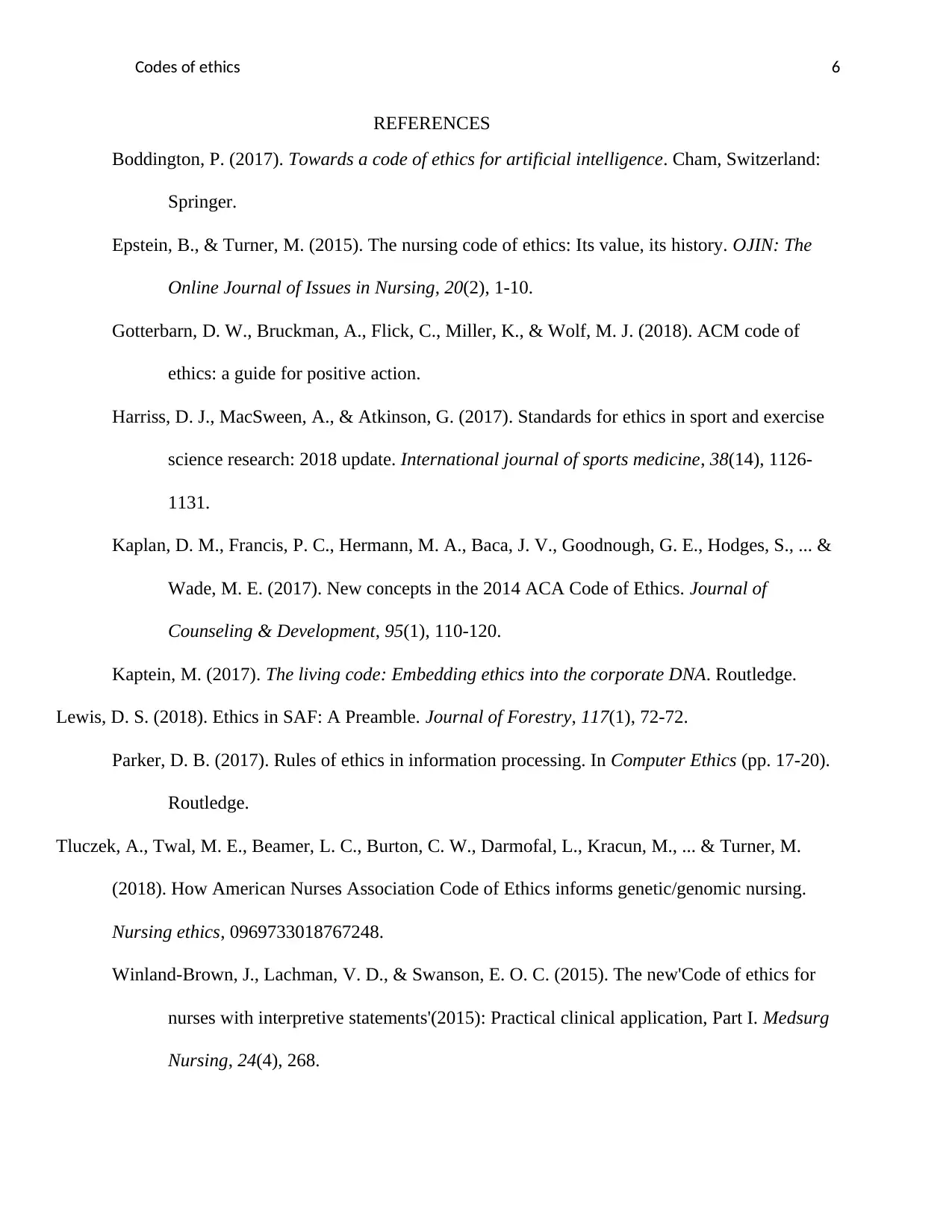
Codes of ethics 6
REFERENCES
Boddington, P. (2017). Towards a code of ethics for artificial intelligence. Cham, Switzerland:
Springer.
Epstein, B., & Turner, M. (2015). The nursing code of ethics: Its value, its history. OJIN: The
Online Journal of Issues in Nursing, 20(2), 1-10.
Gotterbarn, D. W., Bruckman, A., Flick, C., Miller, K., & Wolf, M. J. (2018). ACM code of
ethics: a guide for positive action.
Harriss, D. J., MacSween, A., & Atkinson, G. (2017). Standards for ethics in sport and exercise
science research: 2018 update. International journal of sports medicine, 38(14), 1126-
1131.
Kaplan, D. M., Francis, P. C., Hermann, M. A., Baca, J. V., Goodnough, G. E., Hodges, S., ... &
Wade, M. E. (2017). New concepts in the 2014 ACA Code of Ethics. Journal of
Counseling & Development, 95(1), 110-120.
Kaptein, M. (2017). The living code: Embedding ethics into the corporate DNA. Routledge.
Lewis, D. S. (2018). Ethics in SAF: A Preamble. Journal of Forestry, 117(1), 72-72.
Parker, D. B. (2017). Rules of ethics in information processing. In Computer Ethics (pp. 17-20).
Routledge.
Tluczek, A., Twal, M. E., Beamer, L. C., Burton, C. W., Darmofal, L., Kracun, M., ... & Turner, M.
(2018). How American Nurses Association Code of Ethics informs genetic/genomic nursing.
Nursing ethics, 0969733018767248.
Winland-Brown, J., Lachman, V. D., & Swanson, E. O. C. (2015). The new'Code of ethics for
nurses with interpretive statements'(2015): Practical clinical application, Part I. Medsurg
Nursing, 24(4), 268.
REFERENCES
Boddington, P. (2017). Towards a code of ethics for artificial intelligence. Cham, Switzerland:
Springer.
Epstein, B., & Turner, M. (2015). The nursing code of ethics: Its value, its history. OJIN: The
Online Journal of Issues in Nursing, 20(2), 1-10.
Gotterbarn, D. W., Bruckman, A., Flick, C., Miller, K., & Wolf, M. J. (2018). ACM code of
ethics: a guide for positive action.
Harriss, D. J., MacSween, A., & Atkinson, G. (2017). Standards for ethics in sport and exercise
science research: 2018 update. International journal of sports medicine, 38(14), 1126-
1131.
Kaplan, D. M., Francis, P. C., Hermann, M. A., Baca, J. V., Goodnough, G. E., Hodges, S., ... &
Wade, M. E. (2017). New concepts in the 2014 ACA Code of Ethics. Journal of
Counseling & Development, 95(1), 110-120.
Kaptein, M. (2017). The living code: Embedding ethics into the corporate DNA. Routledge.
Lewis, D. S. (2018). Ethics in SAF: A Preamble. Journal of Forestry, 117(1), 72-72.
Parker, D. B. (2017). Rules of ethics in information processing. In Computer Ethics (pp. 17-20).
Routledge.
Tluczek, A., Twal, M. E., Beamer, L. C., Burton, C. W., Darmofal, L., Kracun, M., ... & Turner, M.
(2018). How American Nurses Association Code of Ethics informs genetic/genomic nursing.
Nursing ethics, 0969733018767248.
Winland-Brown, J., Lachman, V. D., & Swanson, E. O. C. (2015). The new'Code of ethics for
nurses with interpretive statements'(2015): Practical clinical application, Part I. Medsurg
Nursing, 24(4), 268.
1 out of 6
Related Documents
Your All-in-One AI-Powered Toolkit for Academic Success.
+13062052269
info@desklib.com
Available 24*7 on WhatsApp / Email
![[object Object]](/_next/static/media/star-bottom.7253800d.svg)
Unlock your academic potential
© 2024 | Zucol Services PVT LTD | All rights reserved.



